Wednesday, March 29, 2006
PERILS OF NEW YORK LIVING

Imagine driving along the streets on a quiet early morning and then stopping on a red light. While whistling a happy tune waiting for the light to turn green, the very earth below suddenly drops out from under you.
That’s exactly what happened to Nancy Batista according to a New York Times report. At about 3:30 a.m. the other day when she was stopped at a traffic light in her Ford Explorer on Fourth Avenue in Brooklyn, headed south, as in toward the South Pole. A few seconds later, she was heading south as in toward the center of the earth.
What happened was, which has been an every-now-and-then-phenomenon in New York City, is that an ageing water main pipe exploded. In the process, it had scoured away the earth beneath the surface of the street, and Ms. Batista's Ford Explorer broke through the asphalt and fell in. The hole was 10 feet deep. But Ms. Batista was lucky: her S.U.V. landed on a gas main pipe about four feet down. Ms. Batista, 46, escaped with only bruises and cuts, doctors said.
The whole neighborhood around Fourth Avenue and 73rd Street, in Bay Ridge, was lucky as well. This incident did not precipitate the gas main to explode in flames; neither was there any gushing water to flood the neighborhood. Usually, a burst water main would be immediately followed by lost of power, or gas, or water service; restoration to normalcy would take several days.
*
Labels: Life in New York
posted by Señor Enrique at 10:33 AM
| 6 comments
![]()
![]()

Tuesday, March 28, 2006
DO THE STRAND
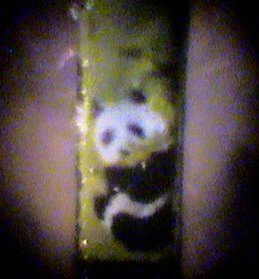
This is a picture of a giant panda — magnified 50000 times — painted on a single strand of human hair by Chinese micro-painter Jin Yin Hua. It took the artist ten days to create the mini-masterpiece using a single rabbit hair as a paintbrush. Gallery visitors who wanted to view the tiny painting had to look through a microscope.
Click here to see his other tiny paintings on human hair.
Labels: Featured artist
posted by Señor Enrique at 7:06 AM
| 4 comments
![]()
![]()

Saturday, March 25, 2006
GOING COCONUTS

Inspired by Niceheart’s Case of Flakes, I am reposting a revised version of my entry originally posted on 10/11/05 as a reminder to friends about the healing properties of coconut oil.
The following is an excerpt (a straight cut and paste job) from the Coconut Research Center Website:
Coconut In Traditional Medicine
People from many diverse cultures, languages, religions, and races scattered around the globe have revered the coconut as a valuable source of both food and medicine. Wherever the coconut palm grows the people have learned of its importance as a effective medicine. For thousands of years coconut products have held a respected and valuable place in local folk medicine.In traditional medicine around the world coconut is used to treat a wide variety of health problems including the following: abscesses, asthma, baldness, bronchitis, bruises, burns, colds, constipation, cough, dropsy, dysentery, earache, fever, flu, gingivitis, gonorrhea, irregular or painful menstruation, jaundice, kidney stones, lice, malnutrition, nausea, rash, scabies, scurvy, skin infections, sore throat, swelling, syphilis, toothache, tuberculosis, tumors, typhoid, ulcers, upset stomach, weakness, and wounds.
Coconut In Modern Medicine
Modern medical science is now confirming the use of coconut in treating many of the above conditions. Published studies in medical journals show that coconut, in one form or another, may provide a wide range of health benefits. Some of these are summarized below:
- Kills viruses that cause influenza, herpes, measles, hepatitis C, SARS, AIDS, and other illnesses.
- Kills bacteria that cause ulcers, throat infections, urinary tract infections, gum disease and cavities, pneumonia, and gonorrhea, and other diseases.
- Kills fungi and yeasts that cause candidiasis, ringworm, athlete's foot, thrush, diaper rash, and other infections.
- Expels or kills tapeworms, lice, giardia, and other parasites.
- Provides a nutritional source of quick energy.
- Boosts energy and endurance, enhancing physical and athletic performance.
- Improves digestion and absorption of other nutrients including vitamins, minerals, and amino acids.
- Improves insulin secretion and utilization of blood glucose.
- Relieves stress on pancreas and enzyme systems of the body.
- Reduces symptoms associated with pancreatitis.
- Helps relieve symptoms and reduce health risks associated with diabetes.
- Reduces problems associated with malabsorption syndrome and cystic fibrosis.
- Improves calcium and magnesium absorption and supports the development of strong bones and teeth.
- Helps protect against osteoporosis.
- Helps relieve symptoms associated with gallbladder disease.
- Relieves symptoms associated with Crohn's disease, ulcerative colitis, and stomach ulcers.
- Improves digestion and bowel function.
- Relieves pain and irritation caused by hemorrhoids.
- Reduces inflammation.
- Supports tissue healing and repair.
- Supports and aids immune system function.
- Helps protect the body from breast, colon, and other cancers.
- Is heart healthy; improves cholesterol ratio reducing risk of heart disease.
- Protects arteries from injury that causes atherosclerosis and thus protects against heart disease.
- Helps prevent periodontal disease and tooth decay.
- Functions as a protective antioxidant.
- Helps to protect the body from harmful free radicals that promote premature aging and degenerative disease.
- Does not deplete the body's antioxidant reserves like other oils do.
- Improves utilization of essential fatty acids and protects them from oxidation.
- Helps relieve symptoms associated with chronic fatigue syndrome.
- Relieves symptoms associated with benign prostatic hyperplasia (prostate enlargement).
- Reduces epileptic seizures.
- Helps protect against kidney disease and bladder infections.
- Dissolves kidney stones.
- Helps prevent liver disease.
- Is lower in calories than all other fats.
- Supports thyroid function.
- Promotes loss of excess weight by increasing metabolic rate.
- Is utilized by the body to produce energy in preference to being stored as body fat like other dietary fats.
- Helps prevent obesity and overweight problems.
- Applied topically helps to form a chemical barrier on the skin to ward of infection.
- Reduces symptoms associated the psoriasis, eczema, and dermatitis.
- Supports the natural chemical balance of the skin.
- Softens skin and helps relieve dryness and flaking.
- Prevents wrinkles, sagging skin, and age spots.
- Promotes healthy looking hair and complexion.
- Provides protection form damaging effects of ultraviolet radiation form the sun.
- Helps control dandruff.
- Does not form harmful by-products when heated to normal cooking temperature like other vegetable oils do.
- Has no harmful or discomforting side effects.
- Is completely non-toxic to humans.
Related Links:
Source for Research on the Health Benefits of Coconut Oil
The Health Benefits of Virgin Coconut Oil
Diabetes and Virgin Coconut Oil
Virgin Coconut Oil: How It Has Changed People's Lives
Photo credit: Proust
*
Labels: health issues
posted by Señor Enrique at 10:00 AM
| 5 comments
![]()
![]()

Friday, March 24, 2006
Master Filmmaker: AKIRA KUROSAWA
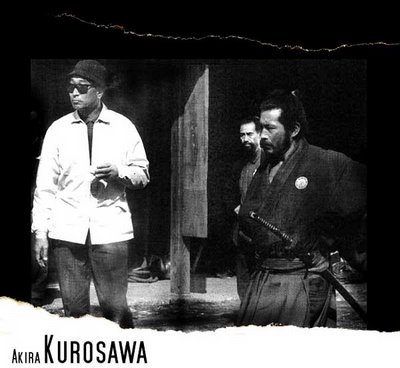
I was happy for Ang Lee when he won this year’s Oscar for Best Director. Hopefully, he will open the door for other Asian filmmakers — including Filipino directors and cinematographers — to get major projects in Hollywood much like what Sidney Poitier has done for African-American actors.
Nonetheless, before Ang Lee, in the realm of Asian filmmakers, there was the acclaimed Akira Kurosawa whose films — such as Rashomon (1950), Ikiru (1952), Seven Samurai (1954), The Throne of Blood (1957), Kagemusha (1980), and Ran (1985) — greatly influenced major filmmakers worldwide from Sergio Leone to George Lucas.
Kurosawa went to art school and favored Western style painting. Although a recipient of many important art awards, he gave up the brush to pursue filmmaking. Starting in 1936 until 1943, he worked as an assistant director for Yamamoto Kajiro, one of Japan’s major directors of war propaganda films. Kurosawa initially gained fame as an excellent scenarist, but some of his best scenarios were never preserved on celluloid; only published in journals. Just the same, they were recognized and awarded notable prizes for their freshness of representation. In 1943, Kurosawa was promoted to director and made his first feature film, Sanshiro Sugata. That was the beginning of his illustrious career as a major and influential film director.
An entry about Kurosawa in Encyclopedia Britannica Online mentions that Kurosawa’s films “represent a unique combination of elements of Japanese art—in the subtlety of their feeling and philosophy, the brilliance of their visual composition, and their treatment of samurai and other historic Japanese themes—with a distinctly Western feeling for action and drama and a frequent use of stories from Western sources, both literary classics and popular thrillers.”
Other than for his excellence in filmmaking, Kurosawa also gained notoriety for sparing no expense when it came to providing excessive quantities of high quality gourmet food and exotic delicacies on the set for his entire cast and crew.
Labels: Featured artist, films
posted by Señor Enrique at 7:43 AM
| 8 comments
![]()
![]()

Wednesday, March 22, 2006
MOTHER'S LITTLE HELPER

THEY HAD A GOOD PLAN THEN: Linda would be the first to go and get settled in New York, while her husband David would stay behind to mind the children as they continued their schooling in Manila.
However, misfortune struck when only six months after Cindy had gone, the oldest of their three children, Tina, became pregnant; she and her boyfriend were only 17 at that time. Tina was supposed to earn a degree in Physical Therapy and then go to New York immediately afterwards, but her emotions precluded her better judgment; succumbing to the boyfriend’s carnal desires and now she’s pregnant. She had also moved out to live with her boyfriend at his parents’ house. Both David and Linda were heartbroken.
So as to prevent the youngest child, Cindy, from suffering a similar fate, she was immediately sent to New York to live with her mother; she was only 12 then. The middle child, Ramon, was to follow suit upon graduating from high school.
But David’s plan to travel with Ramon fizzled out when another unpleasant twist of fate hit their Manila home — his father had a stroke which left half of his body paralyzed. David wouldn’t even think of leaving his bedridden father anytime soon, so all plans for him to go to the States were shelved.
Linda was dismayed by all the unfortunate turn of events. She felt guilty enough for having forced her husband to agree with her to move to the States at this point of their lives, and now David seemed to be at his wit’s end -- caring for his father who was convalescing indefinitely in the hospital. The strain was quite evident in his voice whenever they talked on the phone. As a show of support, Linda told her husband to prioritize his father’s needs above all else.
BY THE TIME LINDA WOULD GET HOME from work around midnight, her daughter Cindy would be fast asleep. But always, there would be food on the table that Cindy had cooked earlier. All that Linda had to do was heat it up in the microwave oven. She looked forward to coming home every night to delight in her daughter’s home-cooked meals. Grandma taught Cindy everything about cooking a year before she left to live with her mother.
Linda, rather unconsciously, would ponder on family problems while she feasted alone on her daughter’s cooking; in effect, finding comfort from food. Consequently, she began to steadily gain weight. Worse, she had fallen into a vicious cycle of overeating when depressed, and would get depressed when she overate. Linda’s self-esteem started hitting rock bottom.
FOURTEEN-YEAR-OLD CINDY HAS NOT GONE FOR A DENTAL CHECK UP in more than a year. She had asked her mother to set up an appointment for her when the continued swelling and bleeding in her gums began to frighten her.
The dentist didn’t take too long to diagnose Cindy’s problem. He called Linda at her job and matter-of-factly informed her of his findings: The bleeding in Cindy’s gum, as well as the discoloration of her teeth was caused by certain vitamin deficiencies, which was further exacerbated by the stomach acid that comes up with vomit — common to those suffering from bulimia.
The dentist suggested for Linda to bring Cindy to her regular physician immediately to confirm his diagnosis. Linda was aghast. Her sweet daughter couldn’t possibly be experiencing such problems.
Cindy vehemently denied it when confronted later on by her mother. Deep down, Linda desperately wanted to believe her daughter. However, there were sufficient telltale signs to support the dentist’s diagnosis. For one, Cindy has developed a fondness for chewing gum (to prevent bad breath caused by the stomach acid in her mouth) and would go through a can of air freshener much too quickly (to obscure the stench of vomit in the bathroom). In addition, upon closer inspection, Linda discovered that Cindy’s index finger was calloused and somewhat discolored; proof of her use of it to induce vomiting.
A week later, Cindy’s physician confirmed her fears — that Cindy was indeed suffering from bulimia nervosa. But however frailed her nerves were at that point, Linda nonetheless remained determined to help Cindy overcome her eating disorder. She contacted the therapist who came highly recommended by the physician and arranged for an immediate appointment.
AFTER ABOUT A YEAR OF WORKING as a staff nurse at Lenox Hill Hospital, an opportunity for a higher paying position as a private nurse came up. Linda grabbed it. Working on a 16-hour shift, she would share the duties of caring for an infirmed patient with another Filipina nurse (on the other but only 8-hour night shift) for which Linda received a little more than $500 a day. She only had one day off a week, but being exhausted from working the 7 am-to-11 pm shift, she would spend most of it sleeping. She practically had no time left to spend with Cindy. The young girl, on the other hand, had assimilated into a role of a responsible latchkey kid.
Invariably, no highly-prized position goes without its own political undercurrent. Firstly, private duty nursing is a cliquish affair and competitions can be fierce when getting a case (job assignment). The Filipina nurses are vying for the much sought-after cases against the Jamaicans, Irish, Indian and other ethnic group of nurses in New York. And those in the position to hire and fire thrive on the gifts and other forms of pricey bribes from desperate private duty nurses.
Secondly, malicious maneuverings within each group occur as well. Although Linda may be enjoying her day off, at the back of her mind was the horrible thought that the friend she had chosen to relieve her during her days off might be conniving with the nurse on the other shift to take over her position for good. All they have to do is convince the patient or the appointed family caregiver of the patient to displace her. It had happened once before. Rumor has it that someone convinced the patient to replace Linda with a slimmer, healthier-looking private duty nurse. It was at that time Linda became cognizant that her being overweight could be used against her.
Although some cases can last quite a long time, once the patient dies or checks out from the hospital to move to a nursing home, the private nurses lose their job and wait for a new case. At times, a more reliable source for a new case is a referral from a colleague. However, most of the Filipina private nurses in Linda’s group have been converting to a certain Christian movement. Once a member of it, they were encouraged to aggressively recruit others to convert as well. And if unsuccessful, would ostracize the unwilling person as a non-believer and thereby labeled a foe of the movement.
Linda felt the pressure to join, but she remained adamant; preferring to hold onto her Catholic faith. Yet she knew that once her current case has run its course, she faces the dismal possibility of not receiving any recommendation or invitation from among those peers. And should this happen, she may have to go back to working as a regular staff nurse. The ensuing drastic cut in salary, undoubtedly, would be distressful -- David’s father’s costly medical care alone is wholly dependent upon the money that Linda sends from New York.
On top of all these engrossing tribulations, Linda was about to deal with another serious dilemma; that of Cindy’s
IT TOOK ABOUT SIX MONTHS OF ONE-HOUR SESSIONS TWICE A WEEK for the therapist to gain Cindy’s trust and confidence, as well as unravel the truth behind her eating disorder. As it turned out, Cindy was a casualty of war in school waged not with fists and lethal weapons, but with scathing remarks, which can be even more detrimental to a young person's psyche. Apparently, a culture of cliques steep on intentional meanness ran rampant in her junior high school in which the different and unpopular students were often tormented and ostracized.
Cindy was among those who had become the butt of a clique's disdain; a constant subject to relentless teasing, taunting, and gossip-mongering just because she was different. She was usually not invited to parties that everyone would rave about, as well as ignored by the more popular girls in school. These were indeed demeaning incidents which always reduced her to tears.
Contrary to common belief, girls do engage in bullying just as frequently as boys do and could be just as vicious at it. And the most popular girls are not usually the nicest. The dominant figures in a clique with several hangers on are commonly referred to as “queen bees;” they set the tone of the group’s behavior and manner of dressing. What makes matters worse is that these bullies perceive their cruelty as hip and a cool thing to do.
Adverse effects of bullying are varied. The worst case scenario was the Columbine school shootings in which the perpetrators have been tormented by the school bullies for years. But in most cases, some victims suffer from nightmares while others lose interest in school altogether. For Cindy, it was developing a serious eating disorder. She was petrified of being hideously taunted for being fat as most overweight girls in school were often subjected to.
She was utterly miserable, but didn’t have the heart to approach her mother to discuss her troubled predicament. She was afraid of adding another burden to her mother who was already coping with more than enough problems of her own. Thus, Cindy suffered in silence.
LINDA SEEMED TO BE IN THE VERGE OF A BREAKDOWN after learning from the therapist the cause of her daughter’s problem. “This couldn’t possibly be happening to my baby,” she thought. “And neither should another problem as serious as this one should afflict our family. It’s just too unfair!”
For the first time in her life, Linda felt so completely alone. She terribly missed her husband and the spiritual strength he could provide at times like these. She was distraught by the realization that both she and her daughter — so far removed from their family in Manila — were basically experiencing a similar fate.
Although life back home was not one of affluence, they at least enjoyed the continual warmth and support of a tightly-knit family; getting by all right just the same. But Linda traded all that for a taste of the American dream, and it hasn’t been as auspicious as she had hoped it would be.
Be that as it may, Linda has to get her act together and fast. There’s quite a lot of reevaluations and decisions for her to make; the sooner, the better.
The foregoing story is purely a work of fiction. Any similarities between any characters herein and actual persons living or dead are purely coincidental.
Art credit: MiArt 2006
Artist: Jordi Barnabas
Labels: Fiction
posted by Señor Enrique at 9:06 PM
| 5 comments
![]()
![]()

Monday, March 20, 2006
GOING BACK TO THE MOON

Here’s how artist John Frassanito sees NASA's new crew exploration vehicle in lunar orbit. Building from the best of Apollo and shuttle technology, it will be three times bigger than the Apollo of times past and will carry four astronauts to and from the moon.
This new spaceship will be the centerpiece of NASA's back to the moon project and according to estimates, before the end of the next decade, astronauts will head back to the moon not only for surface explorations, but to remain as well — building outposts and paving the way for eventual journeys to Mars and beyond. Another exciting era for NASA, indeed.
Read more…
Labels: innovations
posted by Señor Enrique at 7:19 AM
| 6 comments
![]()
![]()

Friday, March 17, 2006
ROLLING, ACTION!

The above picture by Chang W. Lee of a house in Queens being prepared for a movie scene was the accompanying photo of a New York Times article about the recent surge of TV and movie productions in New York City. It goes on to say that the film and television industry has become the fastest-growing source of employment, putting almost 10,000 New Yorkers to work over the past year alone. The reason is the 15 percent credit that production companies receive to shoot in New York.
I think that’s just swell. Really. But, however glamorous and lucrative this whole thing is, there’s the often unreported downside as well. That is, the inconvenience experienced by some residents during filming.
Like one early Sunday morning around 7:00 am, I was awakened by the annoying sound of a hovering helicopter. This may be common in South Central, Los Angeles, but definitely odd in my New York neighborhood. As it turned out, they were shooting a scene for another sequel of Bruce Willis’ Die Hard movie.
When I went out with my dog to buy the Sunday paper and some groceries to make breakfast, we had to wait almost half an hour before the production assistants allowed us to cross the street; same on our way back. It took them an entire day to shoot a scene which appeared less than a minute onscreen. Friends and other residents of Manhattan's Upper West Side faced an arduous task of commuting to work when the same film crew took over the 72nd Street subway station and its vicinity for more than two weeks. Bruce Willis, at that point, was losing the love of New Yorkers.
In another incident, my friend’s elderly parents were livid when they had to be told when they could leave and enter their apartment building when Woody Allen was shooting in their lobby and front steps for several days. Another friend was annoyed when Spike Lee was shooting a scene right in front of her Brooklyn ground floor apartment. She wasn’t allowed to open her windows or even peek out.
On tougher neighborhoods, residents would pump up the volume of their stereos and TV sets as soon as they hear the director’s cue for action. Others would purposely open their windows and stick their heads out, especially if they’re within camera range. This would make the producers shell out some cash to buy the residents’ cooperation.
In New York, at least, if someone (not a cast member) appeared quite prominently on camera and the production staff was unable to secure his or her signature on a release form, that person can sue the studio for using his/her image without permission and financial compensation. However, if it was a news item, the law does not apply. I found out about this accidentally and in a very embarrassing way.
It was a beautiful early spring day with the temperature hovering in the 60s. By 3:00 pm I faked illness; told my boss I wasn’t feeling well and needed to take off early to sleep it off. Concern was etched on his face and even suggested that I take a cab home while he pulled out some singles from his pocket to make sure I have change. I told him I have it.
My real intention was to enjoy the rest of that warm early spring afternoon outdoors. I walked up Fifth Avenue to 57th Street and then turned west to meet some friends at a neighborhood Italian bistro for some drinks and dinner. It was a lovely walk with most New Yorkers in a good mood.
Later on in the evening, at the bistro, everyone was having a wonderful time until my friend grabbed my shoulder and pointed at the TV monitor at the bar. On the screen was the local news’ weather report. For its backdrop, they used an earlier video of Fifth Avenue with me walking up nonchalantly from half a block away towards the camera. By the end of the report, my figure filled the entire monitor as I passed by the camera.
Unfortunately, my boss saw it also. After all, it was a segment of New York’s most popular local evening news. The next day, he walked over to my desk and in muted tone said that it was too bad I wouldn’t get any remuneration for my TV appearance. It was considered a news item. He sensed my discomfort and walked away without waiting for my response.
Later on that day, he didn’t come back from lunch. His secretary claimed he called from the restaurant to say he had gone home; sickened by the oysters he had for lunch. I knew better. It was spring fever like what I suffered from the previous day. Besides, they were filming a movie in his neighborhood with his favorite actress Kim Bassinger. It was a chance to see her in person and even get her autograph; if he were lucky enough.
Labels: films, Life in New York
posted by Señor Enrique at 11:00 AM
| 8 comments
![]()
![]()

Thursday, March 16, 2006
DOCTOR K
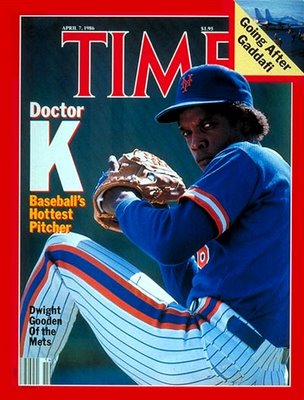
It saddens me to read about former baseball star Dwight Gooden having another brush with the law. According to a New York Times article, he was ordered held without bond the other day and faces up to five years in prison for violating the terms of his probation. He pleaded guilty in November to speeding away from police after a DUI traffic stop in August 2005 for which he was sentenced to three years probation. On Tuesday, he went to a regular meeting with a probation officer where he admitted to once again using cocaine.
Dwight Gooden was once the toast of New York City. He set a major league rookie record with 276 strikeouts in only 218 innings. The strikeouts earned him the nickname Doctor K. He tied the major league mark for strikeouts and instantly became the New York Mets' ace and made them overnight contenders. He was the youngest All-Star ever in the history of major league baseball. He was voted Rookie of the Year in 1984 and won the Cy Young award in 1985 with the "pitcher's Triple Crown," leading the National League in wins and strikeouts.
And then as if suddenly, his troubles with cocaine started making headline news.
I met him once — at the backstage party of Patti LaBelle’s concert at Madison Square — right after his release from rehab. I didn’t really have much to say to him, so after shaking his hand and wishing him luck, I moved on to join my friends. I was surprised at how shy he was.
To this day, Dwight Gooden is one of those troubled stars who would make me wonder what sort of inner turmoil could be so overwhelming that would make gifted people like him resort to illicit drugs just to alleviate it. And in the process, jeopardize everything they had worked so hard for in life.
Labels: personalities, Sports
posted by Señor Enrique at 11:34 AM
| 4 comments
![]()
![]()

Wednesday, March 15, 2006
Hopeless Romantic: BRYAN FERRY
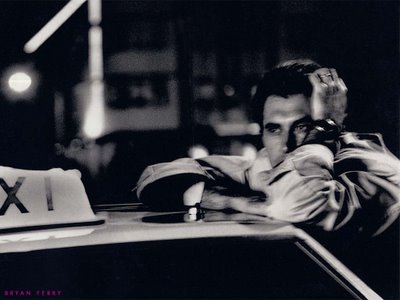
I was pleasantly surprised one hot summer afternoon when my best friend called to ask if I wanted to see a concert at the Academy of Music by the English rock group, Roxy Music; he had an extra ticket, because his friend from school he originally planned to go with was unable to make it. I said sure.
I went without knowing anything about this group, but then again, that’s basically how it goes in New York at any given season. With so many happenings, it's virtually impossible to keep abreast of everything. In the music scene alone, from the city's grand halls to the seedy hole-in-the-wall downtown bars, there's always a gig somewhere that's worth checking out. Also, especially when it comes to music, I've always preferred going to a concert with an open mind; unfettered by some jaded critic's opinion.
On this particular evening, though, from entering the Academy of Music until we were seated, I couldn’t help but notice a rather unusual sight: quite a number of females in the crowd were glamorously dressed; somewhat reminiscent of Hollywood's 1940s glitter era. This was supposedly a rock concert for kids who favor T-shirt, jeans and the occasional loose joints. I was astounded. And it wasn’t until Roxy Music came on stage and performed their music that everything made sense to me.
The group exuded an image of veritable charm and glamour while their music echoed nostalgic romance and elusive love. They were absolutely enchanting. I was hooked as a fan from that moment on.
Bryan Ferry was the founder of this glamour rock band whose initial efforts to shop around their demo tapes to record companies were met by a string of rejections. However, the group won the heart of Jon Peel, Britain’s most respected and popular radio disc jockey, as well as the attention of the weekly music newspaper Melody Maker. Their perseverance eventually paid off when they were signed by EG Management.
When their debut LP was released, much to the chagrin of their detractors, Bryan Ferry, Brian Eno, Andy Mackay, Paul Thompson and Graham Simpson — collectively known as Roxy Music — became overnight stars. Theirs was the most stunning and stylish music; ushering in Britain’s New Wave music phenomenon.
According to Wikipedia, “the group is noted for their combination of idiosyncratic experimentation and sophisticated wit, evident in their literate lyrics, restrained instrumental virtuosity, and highly developed visual presentation (mainly directed by Ferry) which expropriated imagery from the realms of high fashion and commercial photography.”
During the ensuing years, Bryan Ferry also pursued solo recording and concert projects. He became even more popular when one of his songs, Slave to Love, was featured in the movie, 8 ½ Weeks. In June 23, 1977, he performed his first New York solo concert at The Bottom Line with Chris Spedding on guitar; the show was opened by Talking Heads. This particular event became the impetus in my working in the music industry.
There were many songs produced by Roxy Music and Bryan Ferry, but if I had to choose only one as favorite, it would have to be Avalon.
Photo Credit: London Lee
Labels: Featured artist
posted by Señor Enrique at 7:47 AM
| 4 comments
![]()
![]()

Monday, March 13, 2006
CHANGES

THE RELATIONSHIP BETWEEN LEO and his son has been increasingly turbulent, especially since Junior recently dropped out of high school with only less than three months left on the school calendar.
This incident convinced Leo that his son was indeed a congenital idiot for having done it. He wasn't about to blame hormonal imbalance as the root cause of Junior's troubles because he had already passed puberty. Leo reached for a cigarette as if he could smoke away his troubles with his only son and namesake.
Leo operates a car air-conditioning shop in Banawe right off Quezon Avenue. With a handful of similar shops cropping up in the same area, he had to keep his prices low so as to entice customers. He does all right, but business hasn’t been as brisk as the years past. If it hadn’t been for their modest lifestyle and the shop being rent-free — it’s at the ground floor of the house in which his family occupies — he might have already closed down the shop.
This property was willed to him, as well as to his brother and sister (who both live in America with their respective family) by their parents who have long ago passed away. Being in the midst of one of Quezon City’s thriving commercial districts, it could easily fetch at least thirty million pesos. Unfortunately, both brother and sister would immediately shun even the slightest hint of selling it. They both see it as their parents’ legacy borne out of hard work, perseverance and love of family. Easy for them to say, Leo would bitterly muse, for they both live a life of affluence in America.
Junior is the oldest of Leo’s and Amelia’s four children. He’s sixteen whereas the three sisters who followed range in age from fourteen down to six.
The family’s lean household budget would be further strained during the months of July and August; the period when Leo’s teenage nephews and nieces from the States would come over for their summer vacation. Although these teenagers receive substantial spending money from their respective parents during their vacations in Manila, no money was ever given to Leo and Amelia to defray the costs of feeding them during their stay. To make matters worse, the couple had to cater to their American tastes. Hence, Leo would resort to borrowing some cash from the Indian moneylenders at exorbitant interests. Nonetheless, he would always make sure that his nephews and nieces enjoy their vacations in Manila. Leo could be generous to a fault, indeed.
However, the visiting kids also seem to have their adverse influence on the younger Junior. Recently, he has developed a penchant for expensive clothing fashioned after America's popular hip-hop culture. And whenever his cousins were on the verge of running out of spending money, Junior would witness how they would get on their cellphones and demand more money from their parents; behavior that borders on arrogance and disrespect.
No parent wishes to raise a child with ill manners, but sometimes, in the States, when both parents put in long hours at work, they tend to over-compensate for their absence. Manipulative children often perceive this as a sign of weakness and become even more demanding. Worse, since the children have better command of the English language, the parents would find themselves tongue-tied -- unable to articulate their particular point of view. Sadly, they would oftentimes opt to just give in. This is what happened to Junior's stateside cousins. They grew up as spoiled brats; exploiting their parents' shortcomings to no end.
Apparently, in the process of trying to become just like his older cousins, Junior began to resent his own family’s modest background and his parents' inability to provide him with cool stuff. Hence Junior was fast becoming a recalcitrant son; even making a sport of ignoring even his father’s simplest wishes. This irks Leo to no end, but instead of engaging verbal battles with him, he would choose to simply ignore him altogether. Actually, Leo was more concerned that his temper, if uncontrolled, might provoke him into duking things out with his own son. He dreaded such thought.
Lately, tried as he might, Leo couldn’t help but notice Junior wearing new clothes and brandishing a new cellphone. Though already a recipient of slightly worn hand-me-down clothing and a cellphone from his cousins, Leo was unable to figure out where all these new stuff were coming from. And if fate had denied him a loyal son, it had, at least, gifted him with loyal employees. One of his mechanics at the shop told him about Junior’s activities: having partnered with a son of a corrupt cop, they have been selling shabu and marijuana inside an arcade at the nearby public market.
Amelia burst into tears when she was told by Leo about it. She was mortified by the thought of their son getting arrested and jailed. All along, Junior has led them to believe that he was working at this 24-hour arcade and computer shop with the intention of saving money to help pay for his final year of high school. He also claimed of working double-shifts at times -- sleeping at the back stockroom of the arcade. This explained why he sometimes didn’t come home.
A couple of days after learning about his illegal activities, Junior came home just as the couple and their three daughters were finishing their supper. When Leo looked up and locked eyes with his son, his face suddenly revealed a look of extreme pain. He started gasping as he clutched at his chest. He was having a heart attack.
Leo was rushed to the hospital and survived what could have been a tragic incident. However, only a month afterwards, he had to undergo a triple bypass surgery. The operation gave him a new lease on life, so to speak, but most importantly, it was also a moment of awakening for him.
As soon as he had fully recovered and regained mobility, he wrote his brother and sister a letter. In it, Leo expressed his agreement with their wishes to forever honor their dead parents’ legacy, but no longer at his own expense. The annual property taxes and the costs of maintaining an old house is eating away at the meager income of his shop, he told them. He suggested that they lease out the property. The income will pay for its annual upkeep and taxes, as well as for the services of a property manager. Whatever was left over they would then share. He also informed them of his plans to close down his shop and move to Pangasinan where Amelia inherited a farm from her parents.
He also mentioned their kids' fondness for vacationing in Manila; however, staying with them in a farm in Pangasinan would place them much too far from the trendy bars and clubs of Metro Manila, so Leo listed a couple of fancy hotels in Makati where their kids may prefer to stay when they come over next year.
Leo asked Junior to mail the letters and when he came back from his errand, Leo sat down with him for a man-to-man talk. Firstly, he told him of the plan to relocate to his mother’s province. He then admitted to his son that his life has been riddled with bitterness caused by his inability to stand up and speak his mind to his brother and sister. He had allowed them to intimidate him and take advantage of his timidity for far too long. The ill-effects of harboring bitterness and animosity have become unbearable for him.
Furthermore, he told Junior he had already forgiven him for whatever wrong he had done in the past. Forgiveness, he claims, has powerful healing effects in which he would rather immerse in. No more wallowing in angry and bitter thoughts. He then invited Junior to join them in their move to Pangasinan, or he could go to America to live with his cousins if that would make him happy.
Junior was dumbfounded. He was expecting to be lambasted for his wrongdoings and perhaps, even receive a long overdue beating from his father. But he received none of it. His father’s admission of having harbored deep-seated animosity struck a chord with him as well. He, too, was resentful for not experiencing a life of abundance as enjoyed by his cousins. However, being saddled with anger for not having everything he longed for only led him to less desirable paths.
Right there and then, Junior told his father that he’d rather live with them in the farm. He then confided that he had always dreamt of breeding Japanese koi. In fact, he has been privately studying the techniques involved, and now, the prospect of living in the farm would create the opportunity to fulfill his dream. And if he does well with his first pond, he plans to build another until everything becomes a flourishing enterprise. Leo stood up and hugged Junior. Nothing sounded more beautiful than hearing his only son wishing to remain with him and the family.
A couple of weeks passed before Leo received a phone call from his brother in America. He told Leo to go ahead and get the best purchase price for their property. However, before they divide the proceeds, his brother and sister suggested that ten percent should be deducted right off the top and given to Leo for his troubles of handling its sale. They will then equally share the remaining 90 percent.
Leo couldn’t be happier. He would soon be able to pay off the debts they had incurred when he was hospitalized, as well as have the necessary funds to develop the farm; neither would Junior had to wait for too long to build his first pond for breeding Japanese koi.
The foregoing story is purely a work of fiction. Any similarities between any characters herein and actual persons living or dead are purely coincidental.
Photo credit: Koi-Brin
Labels: Fiction
posted by Señor Enrique at 12:17 PM
| 4 comments
![]()
![]()

Saturday, March 11, 2006
TV Rewind: ROME
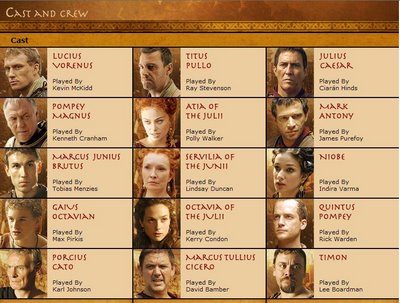
I just finished viewing the DVD box set of the TV series Rome; a collaborative effort by HBO and The BBC. It’s an incredible 12-episode depiction of the Roman Empire from the perspective of two Roman soldiers, Titus Pullo and Lucius Vorenus.
However, regardless of its historical background, parents are hereby forewarned: it contains many scenes not suitable for children (violence, bloodshed, nudity and vulgar language, as well as sub-plots dealing with incest and inter-generational lesbian relationship). Neither does watching this DVD boxset, if one had not already seen its original airing, would be a good way to relax and seek respite from our country's political fiasco; considering that backstabbing, betrayal, lusts for power and election frauds are quite prevalent in the more than ten hours of Rome.
Be that as it may, this is one riveting drama worthy of being included in one's DVD collection.
Series Outline: After eight years of war, Gaius Julius Caesar has completed his masterful conquest of Gaul, and is returning to Rome. He brings with him legions of battle-hardened, loyal men, unimaginable riches in slaves, gold and plunder, and a populist agenda for radical social change. The aristocracy is terrified, and threatens to prosecute him for war crimes if he enters Rome. The delicate balance of power lies in the Senate with Caesar's old friend, partner and mentor, Pompey Magnus.
The year is 52 B.C. Four hundred years after the founding of the Republic, Rome is the wealthiest city in the world, a cosmopolitan metropolis of one million people, epicenter of a sprawling empire. The Republic was founded on principles of shared power and fierce personal competition, never allowing one man to seize absolute control. But now, those foundations are crumbling, eaten away by corruption and excess. The ruling class has become extravagantly wealthy, with a precipitous decline in the old values of Spartan discipline and social unity. There is now a great chasm between the classes. Legal and political systems have weakened, and power has increasingly shifted to the military. Such is the situation when two soldiers of Caesar's 13th Legion, Lucius Vorenus and Titus Pullo, are ordered into the wilds of Gaul to retrieve their legion's stolen standard, the unifying symbol of Caesar's legion, setting off a chain of circumstances that will entwine them in pivotal events of ancient Rome. An intimate drama of love and betrayal, masters and slaves, and husbands and wives, ROME chronicles epic times that saw the fall of a Republic and the creation of an empire.
Labels: films
posted by Señor Enrique at 10:38 AM
| 5 comments
![]()
![]()

Tuesday, March 07, 2006
MORNING AFTER THE OSCARS

Mayor Lito Atenzia has transformed this stretch of Avenida Rizal from Carriedo Street to Claro M. Recto Avenue in Manila's Santa Cruz district into a pedestrian mall. When I was a kid, this was a bustling commercial strip; boasting a row of several movie theaters — Odeon, Galaxy, State, Ideal and Avenue to name a few. At nightfall, the signs of these theaters and various bazaars exhibited an exciting array of neon lights. It was fabulous!
Regrettably, since the aboveground tracks of the light rail transit was built along Avenida Rizal, most enterprises in the area began to lose their charm and glitter. People started to shop and spend their leisure times at the newer air-conditioned malls being built all over Metro Manila.
My father’s office was located at Florentino Torres. He would always take me along on Saturdays when he worked only until noon. After having our lunch in one of the Chinese restaurants in Ongpin, we would then see a movie in Avenida Rizal. This was how I developed a keen fondness for Hollywood movies and its annual Oscar Award festivities. Not that I’ve become a movie and Oscar geek, but watching the Oscars becomes even more exciting when you’ve seen most of the nominated films.
Ironically, in this year’s Oscars, I didn’t see the winner of the Best Movie category, Crash, which practically surprised a lot of people, including its entire cast. I was convinced Brokeback Mountain would snatch the award without a hitch. I was wrong .
I was happy for Philip Seymour Hoffman for having won the Best Actor award, but disappointed he didn’t bark his acceptance speech. Nonetheless, my hunch tells me the members of the Academy voted for him, not only for his incredibly believable portrayal of Truman Capote, but as an overall acknowledgement of his excellence as a character actor in the many films he had done in the past. He reminds me of Geoffrey Rush — not so pretty to look at, but one hell of a great actor.
I should have continued to follow my intuition and root for George Clooney to win the Best Actor award for his portrayal of a CIA operative in Syriana, but allowed the buzz to influence my choosing Matt Dillon in Crash. Lesson learned here: Don't believe the hype!
I’m sure the Internet is teeming with coverage of the Oscar awards ceremony, so I don’t intend to delve much into it; however, I just want to point out another buzz; that is, behind Felicity Huffman’s supposedly astonishing portrayal of a pre-operative male-to-female transsexual (she was among the nominees for Best Actress). I saw Transamerica and throughout the movie, a particular thought kept gnawing at me: Why didn’t the producers opt for a male actor for the role? I thought it was a definite casting blunder; unless, of course, the film was intended as a mere showcase for Ms. Huffman.
This makes me wonder how the 1999 movie, Boys Don’t Cry, would have turned out if the role of Teena Brandon (who was in the throes of sexual identity and preferred to pursue life in her male identity as Brandon Teena) was played by a male actor instead. It would somehow lose its credibility, I’m sure. Therefore, regardless of Felicity Huffman's overly-hyped performance, Transamerica would have fared better, I'm sure, had the transgender role was given to a male actor instead. Hollywood has enough talented make-up artists to handle the visual transformation.
Incidentally, Hilary Swank won the Oscar for Best Actress for her portrayal of Teena Brandon in which she was paid a measly $75 a day for a total of $3,000 for doing Boys Don’t Cry. She won another Oscar for Best Actress — acting opposite Morgan Freeman and Clint Eastwood in the 2004 movie, Million Dollar Baby. She played Maggie Fitzgerald, a 30-something, down-on-her-luck waitress who dreams of becoming a professional boxer.
Labels: films
posted by Señor Enrique at 8:41 AM
| 14 comments
![]()
![]()

Thursday, March 02, 2006
OF PAIN’S VIRTUE AND PIETY

As the plane taxied onto the runway, Carol gazed at the horizon whose orange hue indicated the sun about to rise. Not too many passengers were on this early morning Narita-bound flight, but the connecting flight from Narita to Kennedy would be a full one as is usually the case, she thought.
As the high-pitched sound of the whirling engines intensified, the plane began to gain the necessary speed for a lift off. So as to assuage her pre-flight jitters, Carol thumbed through her copy of Umberto Eco’s The Rule of Four; desperately trying to find the last page she was reading. She had absent-mindedly used her boarding pass as a bookmark; however, when she pulled it out to present to the gate attendants, she lost her place in the book. What she found instead, stuck in the middle pages, was what she has been using originally as a bookmark — a 3 X 5 photograph of her 92-year-old mother and herself taken underneath the mango tree in their backyard a week ago. And then suddenly, that recurring despicable thought once again flashed into her mind — when will she die?
Despite her advanced age and intermittent bouts with arthritis, Carol's mother is fine. Except for the pills to regulate her blood pressure, she has no other prescribed medications to bother with. Her choice of exercise, which she adheres to quite strictly, is strolling around the yard during the early mornings and late afternoons. She has two maids to handle various household chores, help with her baths, and to keep her company. She's also blessed with the constant company of relatives from the province who take turns in coming over to stay in their house for extended periods of time. Indeed, she enjoys an idyllic home setting.
In addition, since about five years ago, her daughter Carol has been spending her annual one-month vacation in Manila. Being the only child, Carol absorbs all her mother's living and household expenses. These financial allotments were never a burden for Carol; in fact, she has no problem whatsoever when it comes to money matters. She earns an impressive income as a certified public accountant and has been with one of New York’s major accounting firms for more than twenty five years. Also, as a single woman with no kids and of senior executive position, she wields a far more substantial disposable income than those by her contemporaries.
Actually, Carol’s a widow; she has been one for twenty years. She and her husband were driving home from a weekend getaway trip in Upstate New York when their car unexpectedly veered and spun out of control. An 18-wheeler truck crashed onto them from behind — violently pushing their car into a ravine. Her husband died from massive cerebral hemorrhage. Carol, on the other hand, survived, but she sustained a spinal injury. Ever since regaining full consciousness at the hospital, Carol wished she had died in that tragic accident along with her husband. It was a death wish borne not by the usual survivor’s guilt syndrome, but by the excruciating pain from her injury that was to remain with her throughout the rest of her life; truly the proverbial fate worse than death.
Consequently, she developed an addiction to Vicodin; without it, she ceases to function.
A couple of years after the accident, she attempted to nurture new relationships — mostly to alleviate her loneliness — but Vicodin’s devious nature surreptitiously alters her emotional and mental stability. She can be incorrigibly petulant and unbearably sarcastic at times — somewhat tolerated in the corporate world but in more personal and intimate settings, such eccentricities can quickly erode any hope for meaningful relationships. She has been living alone in her well-appointed Upper East Side condominium apartment since the death of her husband.
Other than Vicodin, her annual vacations in the Philippines would also reconnect her with a childhood friend — now a doctor at a prestigious local hospital — who would willingly inject her with 50 mg. of Demerol upon request in return for those expensive gifts that Carol would buy her at New York's Tiffany and Cartier.
Carol can afford to give away expensive gifts. Aside from a spinal injury, the accident also left her with a million dollars from her husband’s double indemnity life insurance policy. She also received another million dollar cash settlement from the car manufacturer for its failure to duly recall their car even after it was discovered that it had a certain component known to cause such accidents.
Being a savvy accountant and a shrewd investor, Carol has more than tripled the value of her portfolio, comprised mainly of Manhattan real estate and stocks from blue chip and Internet start-up companies.
Her Philippine vacations also enabled her to regularly evaluate the amount of money she intends to leave to relatives and needy local institutions in the event of her death. If she could only permanently get rid of those excruciating pains, she would gladly trade her fortune for such opportunity. However, she is coping with an irreversible spinal injury and the pain-free state that she longs for, unfortunately, could only be attained through death. Hence, with no miracle cure in the offing, suicide has become her only viable option. She has since learned about self-induced cardiac arrest through Demerol overdose. What a blissful way to die, she thought. And if she were to pursue her plan, it would be right after her mother’s demise.
There is no definitive unit of measurement for pain; therefore, no one could possibly fathom the suffering that she constantly endures. To question her mental faculty for resorting to suicide would only be a futile attempt, especially when one has never experienced the searing pain that literally debilitates her entire being — emotionally, physically and spiritually. Indeed, such continual torture has warped her perspective on death and dying. She now equates suicide as simply akin to abortion. The pain that perpetually torments her is just as insidious as a repulsive incestuous rape; thus, she argues to herself, suicide becomes a fully justifiable choice. But no matter how Carol had deduced such final solution to her dilemma, nothing can be so hideous as to wish for her own mother's early passing so as to realize her own death wish. This is how her pain had ultimately corrupted her soul.
At this point of her life, she had given up on finding virtue and piety from her pain and suffering. Her dependence on painkillers had put her in the same league among hardcore, low life crack addicts who frequent skid rows. Ironically, this is her only means to make her life manageable.
Truth be told, Vicodin and Demerol do not completely eradicate her pain; in fact, the pain remains. Those analgesics only divert her attention away from the torturous throbbing sensation which seemingly paralyzes her entire being. This is the simple reason why painkillers become highly addictive. They offer a soothing cerebral sanctuary; a respite from what feels like a cursed and deranged human existence.
Sitting for long periods of time often trigger painful spasms in her lower spine area, so Carol popped two more Vicodin pills prior to disembarking when her plane landed at Narita Airport. Regrettably, an airport terminal is not the ideal environment to be stuck in when you're entranced in a mild opium-like state of delirium. The one hour waiting period in between flights dragged on as if in perpetuity. When she finally boarded the New York-bound flight and found her seat, all she could think of was taking a nap. She didn't have to expend too much effort; her incredibly comfortable first-class seat soon lulled her to sleep.
Unbeknownst to Carol, the passenger assigned to take the seat next to her is a New York-based medical doctor, a divorcé of about the same age as she. His revolutionary book on pain management was recently published and he was in Tokyo for a week-long conference; he was its keynote speaker.
The doctor was immediately drawn to her, and felt somewhat embarrassed when he found himself glancing too often at the slumbering Carol. It’s a long flight, he thought. They have ample time to chat and get to know one another later on.
Meanwhile, back in Sampaloc, Manila, Carol’s mother had just finished her mid-morning prayer. Like all mothers with distinct connection with their children, her intuition suggests something is troubling Carol. But since she has been keeping whatever it is to herself, the only thing she could do is pray for her daughter to be guided to find the perfect answer to her problem. And Carol's mother solemnly performs this daily ritual unfailingly.
The foregoing story is purely a work of fiction. Any similarities between any characters herein and actual persons living or dead are purely coincidental.
Art credit:
Title: The Lost, 1986
Artist: James Child
Labels: Fiction
posted by Señor Enrique at 8:20 AM
| 7 comments
![]()
![]()

Wednesday, March 01, 2006
SPENDING THE NIGHT TOGETHER IN SHANGHAI

Convinced that the ‘60s bad boys of rock are no longer able to pollute the spiritual consciousness of the country’s young, China’s culture commissars finally allowed The Rolling Stones their mainland debut concert in Shanghai this coming April 8th.
The Stones had once planned to perform in China in 2003, but cancelled due to the SARS scare. Back then, according to Reuters, China’s Ministry of Culture told the band it could not perform four songs -- "Let's Spend the Night Together," "Brown Sugar," "Honky Tonk Women" and "Beast of Burden."
Although no specific reasons were given, it was assumed those songs’ sexually explicit lyrics were the culprit; highly likely, the group will neither play those songs at the upcoming concert so as not to offend the Chinese government.
According to Emma Entertainment, which handles the ticket sales for the British rockers' Shanghai Grand Stage performance, prices will set you back between $37 and $373.
On a side note: I saw the Stones once in Madison Square Garden; Stevie Wonder opened the show. The promoters asked the fans to mail in—as many as they wished—a postcard with his name, address and phone number listed on it. If you were lucky enough to have yours picked out, you get the chance to purchase two tickets. This was done to prevent a bunch of kids from camping out on the grounds of Madison Garden days before the tickets went on sale. I forgot how much I paid for the tickets.
Labels: Featured artist, music
posted by Señor Enrique at 8:05 AM
| 0 comments
![]()
![]()



